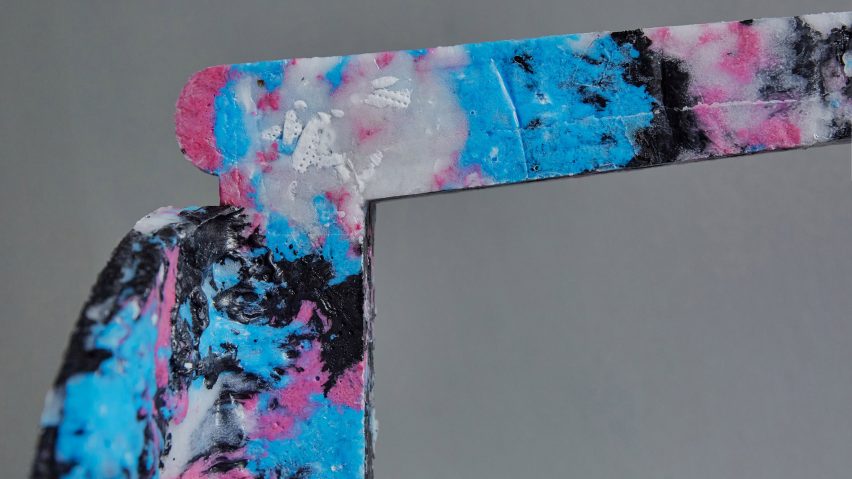South Korean designer Haneul Kim has collected thousands of used disposable face masks from his university campus and recycled them to create a stackable stool.
Called Stack and Stack, the project hopes to set an example for how the 129 billion single-use face-masks that the world goes through every month during the coronavirus pandemic can be diverted from ending up in landfill and in our oceans.
"In the beginning, I stockpiled disposable masks used by me and my friends but the quantity that could be collected in this way was limited," said the Kaywon University student. "So I installed mask collection boxes on campus and emptied them periodically."
After quarantining them over a period of days, Kim stacked the masks inside of a mould and melted them one by one using a heat gun.
Gradually, the material built up to create a sturdy seating design, with around 250 masks needed to form each leg and another 750 for the seat.
The final result needs no glue or resin to hold it together and is completely made from the recycled personal protective equipment (PPE), with no added materials. Even the stools' marbled white, blue and pink patterns are derived not from added dyes or paints but simply from the colour of the original masks.
"I remove the metal wire that tightens the nose and the cotton ear loops. This leaves the polypropylene filter surrounded in a non-woven plastic fabric, which I melt using hot air of more than 300 degrees Celsius," Kim told Dezeen.
"When the liquefied plastic slowly cools and hardens again, this creates a tough, durable plastic."
As face masks became mandatory in many public spaces and countries across the world due to the coronavirus pandemic, global sales of the disposable face-coverings reached $166 billion in 2020 according to the United Nations Conference on Trade and Development.
This is more than 200 times as much as in the previous year, when sales totalled only $800 million.
The UN estimates that up to 75 per cent of these masks will end up in landfill or in our waterways, with PPE already found on 30 per cent of all UK beaches.
Designers and activists, including Nienke Hoogvliet and Parley for the Oceans founder Cyrill Gutsch, have also expressed concern that the coronavirus pandemic is hindering the hard-fought move away from single-use plastics.
"It seems that most people prioritise the pandemic and put the environment second," industrial designer Dave Hakkens told Dezeen.
In response, his recycling initiative Precious Plastics has released a protective face shield that is made from recycled waste plastic.
Similarly, Adidas was among the first big-name brands to release a reusable face mask, fashioning it from a high-performance recycled fabric that is free from virgin plastic.

